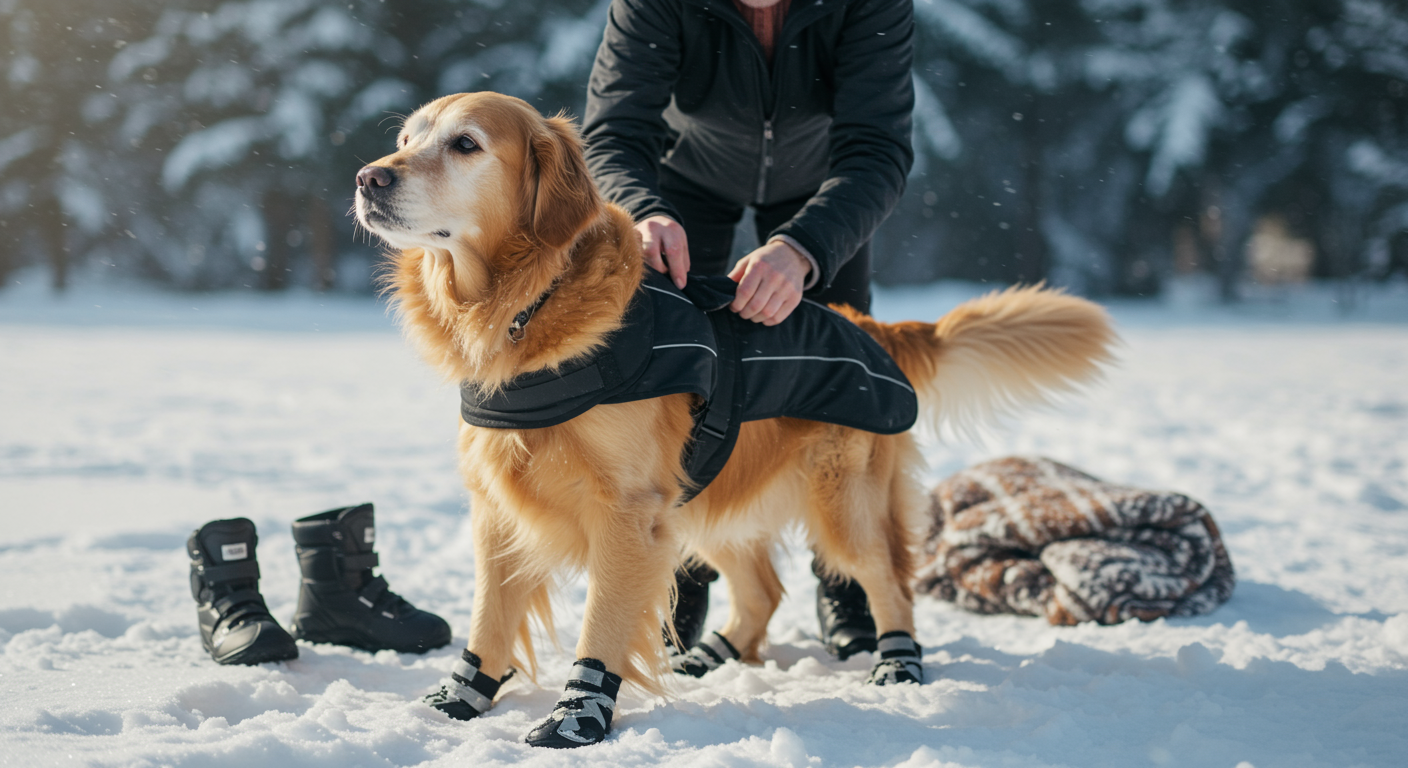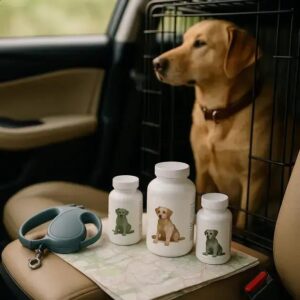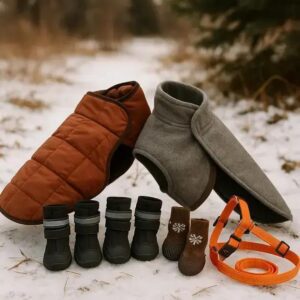Winter weather presents unique challenges for senior Golden Retrievers, whose aging bodies may struggle more with temperature regulation, joint stiffness from cold weather, and seasonal environmental hazards. Understanding these winter-specific needs helps families provide comprehensive care that keeps their beloved companions comfortable, safe, and healthy throughout the colder months.
Senior Golden Retrievers often experience increased arthritis pain during cold weather, reduced tolerance for temperature extremes, and greater vulnerability to winter-related health issues such as dry skin, respiratory irritation, or injuries from icy conditions. Proactive winter care planning addresses these challenges while maintaining quality of life.
Effective winter care encompasses temperature management, exercise adaptations, skin and coat protection, nutritional adjustments, and safety precautions that support senior dogs through seasonal challenges while preserving their enjoyment of winter activities and outdoor exploration.
Understanding Winter Challenges for Senior Dogs
Temperature Regulation Difficulties
Age-Related Thermoregulation Changes
Senior Golden Retrievers often experience decreased ability to maintain body temperature due to changes in circulation, metabolism, and coat insulation that occur naturally with aging processes.
Reduced muscle mass common in senior dogs affects heat generation, while potential heart or circulation issues can impact the body’s ability to distribute warmth effectively throughout extremities and core areas.
Understanding these physiological changes helps families recognize that senior dogs may need additional warmth and protection even in temperatures that previously caused no discomfort or concern.
Cold Sensitivity Indicators
Signs of cold sensitivity in senior Golden Retrievers include shivering, seeking warm areas, reluctance to go outside, or shortened outdoor activity periods compared to their younger years or warmer weather preferences.
Some senior dogs may show increased stiffness, slower movement, or apparent discomfort during cold weather, indicating that low temperatures are affecting their comfort and mobility levels.
Recognizing individual cold sensitivity helps guide appropriate protection measures and indoor alternatives for maintaining comfort during winter weather conditions.
Arthritis and Joint Stiffness
Cold Weather Joint Impact
Cold temperatures often increase joint stiffness and arthritis pain in senior Golden Retrievers, making movement more difficult and potentially reducing their willingness to engage in normal activities.
Barometric pressure changes associated with winter weather systems can also affect joint comfort, causing increased stiffness or discomfort even before temperature drops become severe.
Understanding the connection between cold weather and joint discomfort helps families prepare appropriate support measures and pain management strategies during winter months.
Mobility Adaptations
Senior dogs may require longer warm-up periods before outdoor activities during cold weather, allowing joints to become more flexible and comfortable before engaging in walks or play.
Indoor exercise alternatives become particularly important during severe cold periods when outdoor activity may be limited by weather conditions or the dog’s comfort tolerance.
Understanding mobility challenges helps families plan appropriate exercise and activity modifications that maintain fitness while respecting cold weather limitations.
Winter Clothing and Protection
Appropriate Clothing Selection
Coat and Sweater Benefits
Quality dog coats or sweaters can provide significant warmth for senior Golden Retrievers, particularly those with thinning coats or reduced body fat that affects natural insulation.
Waterproof outer layers protect against snow and moisture while breathable inner materials prevent overheating during active periods or when transitioning between outdoor and indoor environments.
Understanding proper fit and materials helps ensure that clothing provides protection without restricting movement or causing discomfort during wear.
Protective Footwear
Dog boots protect senior paws from ice, snow, salt, and chemical de-icers that can cause injury, irritation, or toxic exposure through paw pad contact or licking.
Senior dogs with reduced sensation in their paws may be more vulnerable to cold-related injuries such as frostbite or chemical burns from ice-melting products used on walkways.
Understanding boot selection and gradual introduction helps ensure that protective footwear is accepted and effective for paw protection during winter activities.
Winter Care Management Strategies
| Care Aspect | Indoor Strategies | Outdoor Strategies | Daily Routine | Warning Signs |
|---|---|---|---|---|
| Temperature Control | Warm bedding, draft elimination | Protective clothing, limited exposure | Monitor comfort levels | Excessive shivering, seeking heat sources |
| Exercise Adaptation | Indoor activities, hallway walks | Shorter outdoor sessions, warm-up time | Maintain activity levels | Reluctance to move, stiffness |
| Paw Care | Daily inspection, moisturizing | Protective boots, post-walk cleaning | Clean paws after outings | Limping, excessive licking, irritation |
| Coat Protection | Humidifiers, gentle brushing | Waterproof outer layers | Regular grooming checks | Dry skin, excessive shedding, matting |
| Hydration Support | Encourage water intake, warm water | Fresh water access, prevent freezing | Monitor water consumption | Decreased drinking, dry gums |
| Safety Measures | Secure heating sources | Leash use on ice, avoid chemicals | Environmental hazard assessment | Slipping, disorientation, exposure symptoms |
Indoor Environment Optimization
Heating and Warmth Management
Safe Heating Solutions
Providing additional warmth through safe heating methods such as heated dog beds, warming mats designed for pets, or space heaters with appropriate safety features helps maintain comfort.
Understanding heating safety prevents burns or overheating while ensuring that senior dogs have access to comfortable warmth during cold periods without safety risks.
Positioning warm sleeping areas away from drafts while ensuring adequate ventilation helps maintain comfortable temperatures without creating stuffiness or poor air quality.
Draft Elimination
Identifying and blocking cold drafts from windows, doors, or other sources helps maintain consistent indoor temperatures while reducing cold spots that might affect senior dog comfort.
Insulating sleeping areas with blankets, rugs, or insulating materials creates warmer microclimates where senior dogs can rest comfortably during cold weather periods.
Understanding air flow patterns helps families optimize indoor environments for senior dog comfort while maintaining healthy air circulation throughout living spaces.
Humidity and Air Quality
Preventing Dry Air Issues
Winter heating systems often create dry indoor air that can cause skin irritation, respiratory discomfort, and coat problems for senior Golden Retrievers with sensitive systems.
Humidifiers help maintain appropriate moisture levels in the air, supporting respiratory comfort and preventing dry skin issues that can become problematic during winter months.
Understanding optimal humidity levels helps families balance moisture control with preventing excessive humidity that could create other problems such as mold or mildew growth.
Air Quality Maintenance
Ensuring good ventilation while maintaining warmth helps prevent stale air buildup that can affect respiratory health, particularly important for senior dogs with potential breathing sensitivities.
Regular cleaning of heating systems and air filters helps maintain air quality while ensuring that heating systems operate efficiently and safely throughout winter months.
Understanding air quality factors helps families create healthy indoor environments that support respiratory health while providing necessary warmth and comfort.
Outdoor Activity Adaptations
Exercise Modifications
Timing Adjustments
Scheduling outdoor activities during warmer parts of winter days, typically mid-afternoon when temperatures are highest, helps maximize comfort while maintaining necessary exercise.
Shorter, more frequent outdoor sessions may be preferable to longer activities that could lead to overexposure to cold temperatures or excessive chilling.
Understanding optimal timing helps families maintain exercise routines while adapting to seasonal temperature patterns and senior dog comfort limitations.
Activity Selection
Low-impact activities that don’t require prolonged ground contact, such as short walks on cleared paths, may be more comfortable than activities involving extended time in snow or on cold surfaces.
Indoor alternatives such as hallway walking, stair climbing (if appropriate for the individual dog), or interactive play help maintain fitness when outdoor conditions are unsuitable.
Understanding activity options helps families maintain senior dog fitness and mental stimulation regardless of weather conditions or outdoor accessibility.
Safety Precautions
Ice and Traction Hazards
Identifying and avoiding icy surfaces helps prevent falls and injuries that could be particularly serious for senior dogs with balance or mobility challenges.
Using leashes even in familiar areas provides additional stability and control when walking on potentially slippery surfaces during winter conditions.
Understanding traction aids such as sand, pet-safe ice melt, or temporary traction mats helps create safer walking areas for senior dogs during icy conditions.
Chemical Hazard Avoidance
Avoiding areas treated with ice-melting chemicals helps prevent paw pad irritation, chemical burns, or toxic ingestion from licking contaminated paws after walks.
Understanding which de-icing products are safe for pets and which should be avoided helps families make informed decisions about walking routes and paw protection measures.
Post-walk paw cleaning helps remove any chemical residues while allowing inspection for injuries, irritation, or signs of cold-related damage requiring attention.
Skin and Coat Care
Winter Skin Health
Moisture Protection
Winter air and heating systems can cause dry, flaky skin that becomes uncomfortable and may lead to excessive scratching or secondary skin problems in senior dogs.
Gentle moisturizing products designed for dogs can help maintain skin hydration while preventing irritation or allergic reactions that could worsen skin condition.
Understanding appropriate moisturizing techniques and products helps families support skin health without causing problems or interfering with natural skin function.
Grooming Adaptations
Regular but gentle brushing helps distribute natural oils while removing dead skin cells and preventing matting that can worsen during winter months when coats may be thicker.
Understanding grooming frequency adjustments helps maintain coat health while avoiding over-grooming that could irritate sensitive senior skin during dry winter conditions.
Professional grooming services can provide specialized winter coat care that maintains health and appearance while addressing seasonal coat and skin needs.
Coat Protection
Natural Oil Preservation
Avoiding over-bathing during winter months helps preserve natural skin oils that provide insulation and protection against dry air and cold temperatures.
Understanding bathing frequency adjustments helps maintain cleanliness while supporting natural coat protection mechanisms that become more important during winter months.
Using gentle, moisturizing shampoos when bathing is necessary helps clean while supporting skin and coat health during potentially drying winter conditions.
Nutritional Considerations
Caloric and Nutritional Adjustments
Energy Requirements
Senior Golden Retrievers may require slight caloric increases during winter months to support thermoregulation, though individual needs vary based on activity level and indoor heating availability.
Understanding metabolic changes that may occur with temperature regulation helps guide appropriate nutritional adjustments while avoiding overfeeding that could cause weight gain.
Monitoring body condition and weight helps ensure that nutritional adjustments support health without causing obesity that could worsen other senior health issues.
Hydration Maintenance
Ensuring adequate water intake becomes particularly important during winter when dry air and heating systems can increase fluid needs while cold weather may reduce drinking motivation.
Providing slightly warm water or preventing water from becoming too cold can encourage drinking while supporting hydration needs during winter months.
Understanding hydration indicators helps families monitor fluid intake and identify when additional encouragement or intervention may be necessary for maintaining proper hydration.
Supplement Considerations
Joint Support
Supplements supporting joint health may be particularly beneficial during winter months when cold weather can worsen arthritis symptoms and joint stiffness in senior dogs.
Understanding appropriate supplement selection and dosing helps support joint comfort while ensuring safety and avoiding interactions with other medications or treatments.
Professional guidance about supplement use helps ensure that additions to the diet support health goals while maintaining nutritional balance and safety.
Health Monitoring and Maintenance
Seasonal Health Checks
Condition Assessment
Regular assessment of coat condition, skin health, and overall comfort helps identify winter-related issues early when intervention can be most effective.
Understanding normal seasonal adaptations versus concerning changes helps families distinguish between expected winter adjustments and problems requiring attention.
Documentation of seasonal patterns helps families anticipate needs while providing valuable information for veterinary consultations about winter care approaches.
Professional Care Coordination
Scheduling veterinary check-ups before severe winter weather helps ensure that health issues are addressed and medications are adjusted appropriately for seasonal needs.
Understanding when winter-related symptoms require professional evaluation helps ensure appropriate care while avoiding unnecessary anxiety about normal seasonal adaptations.
Communication with veterinary professionals about winter care concerns helps ensure comprehensive support for senior dog health throughout cold weather periods.
Emergency Preparedness
Winter Emergency Planning
Severe Weather Preparation
Preparing for power outages, severe storms, or other winter emergencies that could affect heating, food supplies, or veterinary access helps ensure senior dog safety during crises.
Understanding emergency heating alternatives, food storage, and medication management helps families prepare for situations where normal care routines might be disrupted.
Creating emergency kits with appropriate supplies for senior dog needs helps ensure readiness for unexpected situations that could affect care availability.
Cold Exposure Response
Understanding signs of hypothermia, frostbite, or other cold-related emergencies helps families recognize when immediate intervention is necessary for senior dog safety.
Knowing appropriate first aid measures for cold exposure while understanding when professional emergency care is necessary helps ensure appropriate responses to winter emergencies.
Having emergency contact information readily available helps ensure prompt access to professional care when winter-related health issues require immediate attention.
Quality of Life Maintenance
Comfort and Happiness
Maintaining Enjoyment
Finding ways to preserve enjoyable winter activities through appropriate modifications helps ensure that senior Golden Retrievers continue to experience pleasure during cold months.
Understanding individual preferences and limitations helps guide activity selection that maintains engagement while respecting comfort and safety requirements.
Creating positive winter experiences through appropriate protection and modified activities helps senior dogs continue to enjoy seasonal changes while staying safe and comfortable.
Emotional Support
Providing additional comfort and attention during challenging winter weather helps support emotional well-being when physical limitations may be more pronounced.
Understanding that winter challenges may create anxiety or discomfort helps families provide appropriate reassurance and support during difficult weather periods.
Maintaining routine and normalcy where possible helps provide security and comfort for senior dogs who may find winter weather changes stressful or uncomfortable.
Winter care for senior Golden Retrievers requires thoughtful planning, appropriate protection, and adaptive strategies that address the unique challenges cold weather presents for aging dogs. Through comprehensive attention to temperature management, safety precautions, and comfort measures, families can help their senior companions navigate winter months with maintained health and happiness.
Success in winter care comes from understanding individual needs, preparing proactively for seasonal challenges, and maintaining flexibility in approaches while prioritizing comfort and safety throughout cold weather periods. With proper attention and care, senior Golden Retrievers can continue to enjoy winter months while staying warm, safe, and comfortable.
The investment in comprehensive winter care demonstrates the ongoing commitment to senior dog welfare while ensuring that the golden years remain filled with comfort, safety, and continued enjoyment of life’s seasonal experiences.




